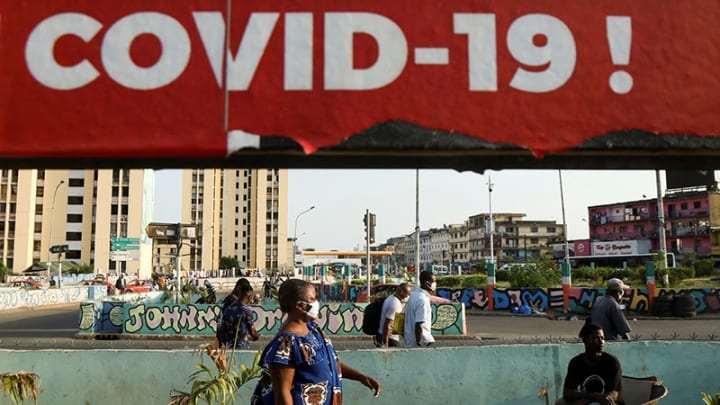
Devex has tracked and analyzed how much COVID-19 funding goes to a region facing the biggest health emergency since the Ebola outbreak.
Nearly 20 years down the line, while countries like Rwanda, Botswana, and Zambia have been able to meet this target, Nigeria has had its allocation to health care consistently below the continental average of 9.8% since the 2001 agreement; it has been less than 5% of budgetary allocation in the past five years.
It was with a budgetary allocation of $1.09 billion, representing 4.14% of the total budgetary allocation for 2020, that the country recorded its first case of COVID-19 on February 27. The contagiousness of the disease, the havoc it has been wrecking in European countries with strong health systems, and the perceived weakness of our health system — caused by poor health financing among other things — led to simultaneous rapid responses on many fronts by the federal government, state governments, private sector players, international donors, and private individuals.
Some of these responses included: setting up isolation centers, provision of medical supplies and personal protective equipment, renovation of hospitals, setting up testing laboratories around the country, and provision of relief items to cushion the effects of the pandemic.
However, the question that begs to be answered is: Will this mark a new era for health financing in Africa’s most populous country?
As stated by the World Health Organization, health financing is one of the six building blocks of every health system. It deals with issues ranging from fiscal space available for health, who pays for health services, and when and how it is paid, to subsidies and coverage for the poor and vulnerable.
The current pandemic has demonstrated the central importance of health in our national life — without it, we have nothing. It has also shown how we can do things differently as regards to financing health care in Nigeria.—
Over the years, health financing has been a major barrier to building a strong health care system in many low- and middle-income countries — Nigeria being no exception. Efforts directed at tackling COVID-19 are already providing a way forward for addressing some of the challenges of health financing in Nigeria.
Going forward — doing things differently in post-coronavirus Nigeria
1. Increase fiscal space for health. The fiscal space for health framework defined by WHO provides a great opportunity to enhance health financing in our setting. With its five pillars of conducive macroeconomic conditions, reprioritization of health within government budgets, provision of health sector-specific resources — sugar, alcohol and tobacco taxes, phone charges for health — increased efficiency in health care expenditure, and use of health sector-specific grants and foreign aids, there is an opportunity to increase funding available for health in the country.
At the moment, the total health expenditure is derived from the allocations for health and allocations for the Basic Health Care Provision Fund, which is put at 1% of the consolidated revenue fund. Since the inception of BHCPF, however, its allocation has always been below the earmarked 1% of CRF; the allocation in 2020 is about 50% less than the value of the 1% of CRF. Taking a stand to address this discrepancy in subsequent budgetary allocations will be a way to start increasing the fiscal space for health.Get development’s most important headlines in your inbox every day.Thanks for subscribing!
More so with the ubiquity of sugar-sweetened beverages in the country and the fact they are in high demand in both rural and urban centers, the time is ripe for the country to tax this product which has long-term detrimental effects to health and devote the tax entirely to financing health care in the country.
2. Sustain coalitions for health. One of the greatest efforts for tackling the coronavirus in the country is the Coalition Against COVID-19, which consists primarily of private sector players. The group has raised over $64 million to tackle the pandemic and support government efforts.
Yet this coalition should go beyond this pandemic era. The private sector should institutionalize this coalition to strengthen the health system, and especially primary health care. This coalition should also be expanded to involve other well-meaning Nigerians, including religious and traditional leaders who are willing to contribute to the country’s health sector. Doing this will make funds available for the lowest level of care which is grossly underfunded, thereby improving access to care by the most vulnerable group in society.
3. Expand the country’s health insurance coverage. The treatment of COVID-19 patients gave citizens a taste of what universal health coverage is, in terms of cost of care: A situation where there is no payment of user fees at the point of care.
At the moment health insurance coverage in the country is very low, especially for the informal sector. After this pandemic, efforts at capturing the informal sector through the various state health insurance schemes should be intensified and alternate approaches like funding through taxation should also be explored in order to reduce the burden of payment at the point of care.
The current pandemic has demonstrated the central importance of health in our national life — without it, we have nothing. It has also shown how we can do things differently as regards to financing health care in Nigeria.
Taking hold of this opportunity to tackle some of the challenges of health financing will mark the beginning of the positive transformation of Nigeria’s health care indices and usher in an era of increased productivity in the country.


